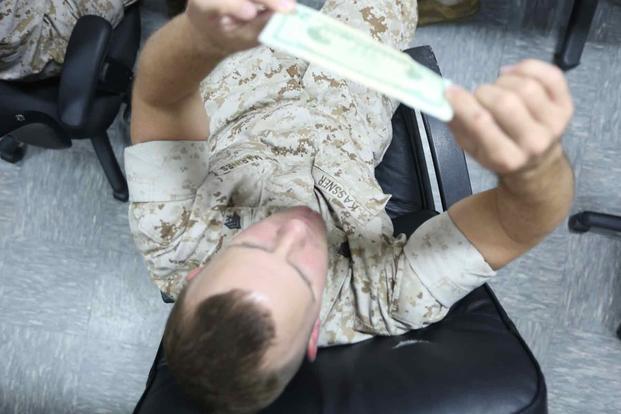Some of the lowest-paid service members will not get a special bonus to help cope with inflation under a compromise defense bill released Tuesday night.
The idea for the one-year benefit was included in a version of the National Defense Authorization Act, or NDAA, passed by the House in July.
But the Senate's version of this year's NDAA included no similar provision, and the bipartisan, compromise language that is expected to become law by the end of the month left the inflation bonuses on the cutting room floor.
Read Next: Military's COVID Vaccine Mandate to Be Repealed by Annual Defense Bill
Still, the compromise bill, which authorizes roughly $857.9 billion in national security funding, includes several items meant to help service members' finances, including an annual pay raise, expansion of an allowance for troops below the poverty line, and flexibility for housing stipends in high-cost areas.
In addition to a base pay raise of 4.6%, the highest in decades, House lawmakers had proposed inflation bonuses of at least 2.4% for service members and Defense Department civilians making less than $45,000 in 2023.
Inflation has cooled somewhat since the House voted for the bonus in July, but consumer prices still rose 7.7% higher in October than they were at the same point last year, according to the most recent update of the Consumer Price Index.
While the inflation bonuses were scuttled from the final bill, a summary of the compromise NDAA released by the Senate Armed Services Committee says the bill authorizes "additional funding to address the effects of inflation on compensation."
Asked how exactly compensation is being boosted to reflect inflation, a committee spokesperson pointed to the base pay raise, as well as funding for the Basic Allowance for Housing, among other provisions. Since the raise is tied to the Employment Cost Index and the housing allowance to rental costs, both are "highly responsive to inflation," the spokesperson said.
The bill would also expand who is eligible for the Basic Needs Allowance. The stipend was created in last year's NDAA to help address food insecurity among service members, though advocates said it fell short because it did not exclude the housing allowance from income calculations and required troops to apply for it.
Right now, the Basic Needs Allowance is available to service members whose income falls below 130% of the federal poverty line. This year's NDAA would expand eligibility by increasing the maximum income to 150% of the federal poverty line. The bill would also give the Pentagon the authority to increase the benefit to 200% of the poverty line if the defense secretary "determines it appropriate."
The bill also includes flexibility on the housing allowance in response to inflation. Specifically, the Pentagon would be allowed to adjust the rate of the housing allowance in the middle of the year in areas where housing costs jump by more than 20%. Typically, the stipend is fixed for the calendar year, though Congress also gave the department authority for mid-year adjustments in last year's NDAA.
The Armed Services Committee spokesperson also pointed to increases for caps on special incentive pays and bonuses for certain personnel with critical skills, bigger allowances for some travel and transportation including for child care and pet relocation costs during a permanent change of station move, and the ability for a housing allowance to stay the same when a service member moves if their new posting would normally afford a lower allowance figure.
Beyond inflation, the bill would create at least one stipend for a major quality-of-life issue.
Troops stationed in Alaska, some of whom train and live in some of the country's most rural areas where temperatures can drop to -50 degrees Fahrenheit, would be eligible for special duty pay. Service members would also get travel reimbursements for the cost of airfare for visiting their home state.
The move for special pay would effectively be the only situation outside of combat zones in which service members would see a pay bump exclusively due to where they are stationed. Usually, special pay is reserved for duty that is especially hazardous, or incentives for high-demand or specialty fields. The Army's 11th Airborne Division's paratroopers also currently earn parachute duty pay, a flat $150 per month.
"The remote location and harsh weather conditions present challenges to service members who are assigned to duty stations in Alaska," lawmakers wrote in a report accompanying the bill. "We encourage the Department of Defense and the military services to continue to develop innovative quality-of-life initiatives designed to improve morale for service members and their families assigned to Alaska."
Military.com was first to report in November that four soldiers in Alaska died by suicide in a month, a grim problem commanders in the region are struggling to grapple with despite a flood of attention from lawmakers and senior leaders.
Maj. Gen. Brian Eifler, commander of the 11th Airborne Division, has said that Alaska isn't for everyone, and that steps need to be taken to make service there as close to all-volunteer as possible. Since the Army started allowing new recruits to pick their first duty station, with some limitations, Alaska has been a top choice.
The original House-passed NDAA had also included a similar bonus for sailors on ships undergoing major maintenance in response to a string of suicides aboard the USS George Washington while the carrier has been receiving nuclear refueling. Instead of $200 monthly stipends, the compromise bill would require the Navy to brief Congress on the "feasibility and advisability" of creating such a benefit.
-- Rebecca Kheel can be reached at rebecca.kheel@military.com. Follow her on Twitter @reporterkheel.
-- Steve Beynon can be reached at steve.beynon@military.com. Follow him on Twitter @StevenBeynon.
Related: 2023 Military Pay Raise Will Be the Largest in 20 Years














